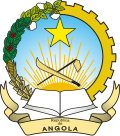Portal:Angola
| This portal or section is in a state of significant expansion or restructuring. You are welcome to assist in its construction by editing it as well. If this portal has not been edited in several days, please remove this template. If you are the editor who added this template and you are actively editing, please be sure to replace this template with {{in use}} during the active editing session. Click on the link for template parameters to use.
This page was last edited by Jonesey95 (talk | contribs) 47 days ago. (Update timer) |
|
Welcome to the Angola Portal
|
Bem-vindo ao Portal de Angola!
 |
 |

| |
Angola, officially the Republic of Angola, is a country on the west-central coast of Southern Africa. It is the second-largest Portuguese-speaking (Lusophone) country in both total area and population and is the seventh-largest country in Africa. It is bordered by Namibia to the south, the Democratic Republic of the Congo to the north, Zambia to the east, and the Atlantic Ocean to the west. Angola has an exclave province, the province of Cabinda, that borders the Republic of the Congo and the Democratic Republic of the Congo. The capital and most populous city is Luanda.
Angola has been inhabited since the Paleolithic Age. After the Bantu expansion reached the region, states were formed by the 13th century and organised into confederations. The Kingdom of Kongo ascended to achieve hegemony among the other kingdoms from the 14th century. Portuguese explorers established relations with Kongo in 1483. To the south were the kingdoms of Ndongo and Matamba, with the Ovimbundu kingdoms further south, and the Mbunda Kingdom in the east.
The Portuguese began colonising the coast in the 16th century. Kongo fought three wars against the Portuguese, ending in the Portuguese conquest of Ndongo. The banning of the slave trade in the 19th century severely disrupted Kongo's undiversified economic system and European settlers gradually began to establish their presence in the interior of the region. The Portuguese colony that became Angola did not achieve its present borders until the early 20th century and experienced strong resistance from native groups such as the Cuamato, the Kwanyama, and the Mbunda. (Full article...)
Selected article
The music of Angola has been shaped both by wider musical trends and by the political history of the country. while Angolan music has also influenced the music of the other Lusophone countries and Latin American countries. In turn, the music of Angola was instrumental in creating and reinforcing "angolanidade", the Angolan national identity. The capital and largest city of Angola — Luanda — is home to a diverse group of styles including kazukuta, semba, kizomba and kuduro. Just off the coast of Luanda is Ilha do Cabo, home to an accordion and harmonica-based style of music called rebita. (Full article...)
Selected biography
António Agostinho Neto (17 September 1922 – 10 September 1979) was an Angolan communist politician and poet. He served as the first president of Angola from 1975 to 1979, having led the Popular Movement for the Liberation of Angola (MPLA) in the war for independence (1961–1974). Until his death, he led the MPLA in the civil war (1975–2002). Known also for his literary activities, he is considered Angola's preeminent poet. His birthday is celebrated as National Heroes' Day, a public holiday in Angola. (Full article...)
General images
Lua error: No content found on page "Fort_of_Sao_Miguel,_Luanda".
Selected picture
Did you know (auto-generated)

- ... that the machete in the flag of Angola symbolizes peasants, agriculture, and the country's war of independence?
Featured articles
Related portals
More Did you know
The page "Portal:Angola/Did you know/8" does not exist.
Topics
Subcategories
New article announcements
Associated Wikimedia
The following Wikimedia Foundation sister projects provide more on this subject:
-
Commons
Free media repository -
Wikibooks
Free textbooks and manuals -
Wikidata
Free knowledge base -
Wikinews
Free-content news -
Wikiquote
Collection of quotations -
Wikisource
Free-content library -
Wikiversity
Free learning tools -
Wikivoyage
Free travel guide -
Wiktionary
Dictionary and thesaurus
Sources















